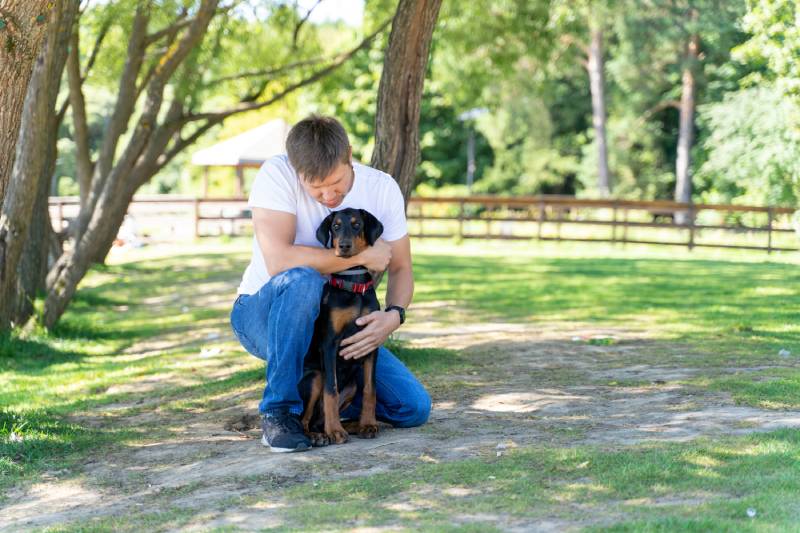Are Dobermans Good for First-Time Owners? Read Before You Get One
Updated on

Congratulations if you’ve decided to take the plunge and join the 69 million American households with at least one dog in their homes! They make marvelous companions and are sure to give you years of joy. It’s essential to understand that breeds vary in their temperament and behavior. Many factors are genetic, which is why you should think carefully before choosing any dog.
The Doberman Pinscher is the 18th most popular breed, according to the American Kennel Club (AKC). Many reasons persuade prospective pet owners to choose this pup. It’s a handsome dog that is intelligent and easy to train. However, it’s not a small breed, with males getting up to 100 pounds. Doberman can make a good choice for first-time owners if you have the time and energy to raise it properly.
Click Below to Skip Ahead:
- The History of the Doberman
- The Case for Getting a Doberman
- The Case Against Getting a Doberman
- Things to Consider Before Getting a Doberman
The History of the Doberman
It helps to start with a breed’s history to determine if it’s a good fit for your family and lifestyle. German tax collector Karl Friedrich Louis Dobermann developed the Doberman by mating existing breeds in Europe. His goal was to have a dog as a protector as he made the rounds on his job. The imposing stature of this pup served him well.
It wasn’t long before the Doberman Pinscher made its way across the pond to the United States. Enthusiasts quickly became enamored with the breed. Its athleticism and loyalty earned the breed a spot in the military during World War II during the Battle of Guam. The K9 corps was known as the “Devil Dogs” for their fierceness on the battlefield.
The Doberman also found a home with law enforcement and in therapy. The pup’s temperament lent itself well to these roles. The strength and agility of the breed laid a solid foundation for trust, which endeared it even more with dog owners. However, does that mean the Doberman is a good pet? Let’s explore both sides of the question.

The Case for Getting a Doberman
An intelligent dog is a good choice for a first-time pet owner because it can make training easier. The pup will pick up on commands and learn tricks quickly, especially if treats are involved. Fortunately, the Doberman is also eager to please. It’s also a loyal and affectionate pet. It isn’t a barker, which is always a plus. The dog isn’t likely to wander off or chase a rabbit. It prefers the home front.
If you want a watchdog, you can’t do much better than getting a Doberman Pinscher. Its formidable appearance is probably one of the best deterrents you can get. On the flip side, this pup is also playful without getting too intense. It’s also easy to groom and less likely to gain weight than other breeds. It will happily accompany you on your walks around town or runs on the trail.
The Doberman is surprisingly adaptable, even to city life. However, it isn’t as open to meeting other dogs, although it may do better with cats in the household. The same precaution applies to strangers, which isn’t unusual, given its purpose. This pet forms strong bonds with its family. Woe to the individual who threatens their tribe.
The Case Against Getting a Doberman
One of the reasons for considering a Doberman may also be one that may deter you is its intimidating looks and history. That’s where training comes into play. It’s a big dog that requires a dedicated owner willing to spend the time to raise it properly. Socialization is another critical factor, given its size and temperament. It’s imperative to allow your pet to meet other dogs and people as a puppy.
As fierce as a Doberman may seem, this pup doesn’t like to be alone. It prefers hanging out with its family. Therefore, it’s not a dog you want to leave for hours on end. Remember that a bored pet is a destructive one, especially when dealing with a breed as intelligent as this one. While the Doberman is a good family pet, it might not be the best choice for small children because of its size.
We must also address the elephant in the room. Nearly 5 million people are bitten by dogs every year, with children at the greatest risk. A study by the American Veterinary Medical Association (AVMA) found that the German Shepherd and mixed breeds were most often involved. However, any canine that is teased or abused will defend itself. That makes proper training critical for any dog.
Unsurprisingly, the Doberman is territorial. Prospective pet owners should instruct their children to avoid approaching the dog while it’s eating or enjoying a snack. It isn’t a nippy pet, but it will watch over its pack and belongings.
Things to Consider Before Getting a Doberman
We’ve touched on the size factor. That will affect your cost of owning a Doberman. The average annual expenses are about $1,480 a year for dog owners. Of course, you’ll end up paying more for food with a Dobie.
Many breeds are predisposed to specific health conditions. This one is no exception. That’s why it’s essential to get your pet from a reputable seller who does the recommended screenings.
These tests will identify breeding animals that are more likely to pass them on to their offspring. An individual can then remove them from their rotation. Conditions that may affect the Doberman Pinscher include:
- Hip dysplasia
- Cardiomyopathy
- Hypothyroidism
- Von Willebrand’s disease
- Wobblers syndrome
A responsible seller will remove any animals with a higher risk of passing on these conditions. You’ll also find that many breeders will offer a guarantee since many disorders show up later in a puppy’s development. Nevertheless, the Doberman is relatively long-lived for a dog of its size. A healthy pup can live up to 12 years with routine veterinary care.
We strongly urge you to get your dog annual check-ups to monitor signs of the conditions for which your pet is at the most risk. We also recommend researching insurance. The breed is relatively healthy, although its popularity may have encouraged inbreeding among unreputable sellers.
Conclusion
The Doberman Pinscher has a lot going for it as a choice for a first-time pet owner. However, its size and intelligence make it a challenging dog to own, particularly if you don’t have the time to devote to training and socialization. We can say the same with any breed. After all, pet ownership is a serious responsibility. We think it’s the first question you should ask before what kind of dog you want to get.
Featured Image Credit: Lena Ogurtsova, Shutterstock













